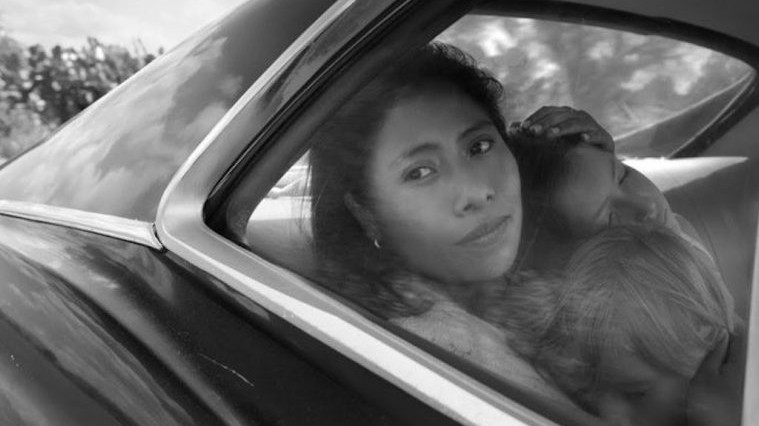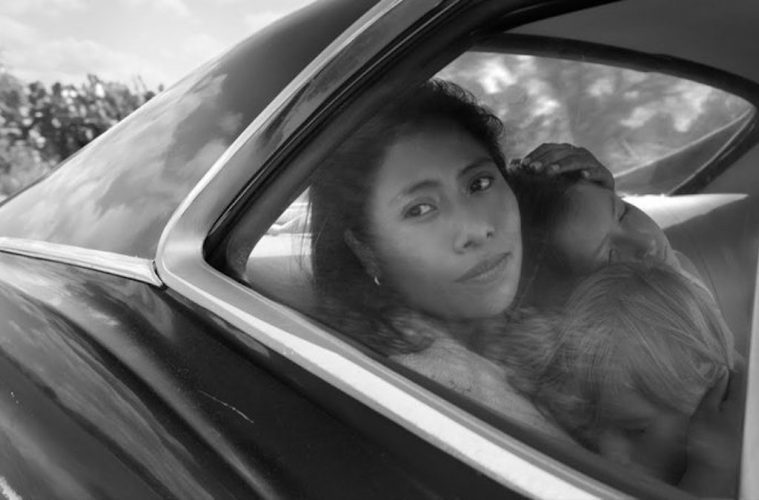They say to writers, “write what you know.”
And what Mexican filmmaker Alfonso Cuarón knows, beyond having made such mesmerizing films that have taken place in the outer limits of space as well as pure magical fantasy, is the city in which he was raised in – Roma, México. Transporting us to his early childhood as a young boy using beautiful 65mm black and white photography, Roma is his most personal work to date: a delicate and sensitive tribute to his past and upbringing and those who raised him. Watching this film – which becomes available to stream on Netflix starting December 14th – he channels heartfelt and honest affection into this story and its characters. To know that the film is both so close to his heart and to see it unfold on the big screen is a majestic thing that should be seen however it can be.
Set in the 1970s, Roma is a testament to the power of female figures as we see the stories of the women who raised him amidst intense hardship. Quiet and demure, the young housemaid Cleo (Yalitza Aparicio) may seem like an unlikely protagonist to base a film around, but we see that she is the silent heart and backbone of this middle-class family that she works for. We see her going about her daily duties – making the family’s meals, picking the children up from school, and caring for the family dog, Borras, whose doggy doo-doo litters the driveway day in and day out. Cleo’s maternal love makes the kids feel loved despite the tension-filled drama between their parents and her own personal struggles.
…it’s because of the nuances of these directorial choices that we have the masterpiece we do.
Though she is quiet, Cleo is such a strong character, experiencing intimacy with a man (Jorge Antonio Guerrero) followed by his sudden departure, remaining resilient and compassionate to her family all the time. She learns valuable lessons throughout her coming-of-age journey that consists of emotional peaks and valleys, but all things push her toward self-love, acceptance, and independence. She comes to realize that life goes on, even when it feels impossible.
Cuarón, who also wrote and edited the film, had a very specific vision of what he wanted Roma to be. Roma is a somewhat unconventional film in that there is no score to speak of, where the intricate sound design and background music from the town’s marching band fills the theater with rich audio. Multiple scenes are shot in a single take, lasting minutes long, weaving and winding throughout the family’s large house. And it’s because of the nuances of these directorial choices that we have the masterpiece we do.
From the very beginning, Cuarón was guarded about the extent of who knew, as the actors, casting director, and various other crew members were never given a script, only being told what each scene would be comprised of on the day of the shoot. What made this method perhaps slightly easier was the decision to shoot the film in chronological order, which is yet another logistical challenge for the crew. Yalitza Aparicio, the lead actress, auditioned for the role of Cleo on a whim (before beginning her first year as a teacher) without even knowing who Alfonso Cuarón was. Unbelievably, Roma is her very first acting job, and the only rule given by Cuarón was to “not look directly into the camera.” This trust in his actors translates from the screen- Aparicio is transfixing and her performance is filled with so much genuine sensitivity that no trained professional could ever emulate.
One magical thing to watch for: water is symbolic for purity and fertility, and Roma plays to this motif quite literally as varying versions of water are “sprinkled” throughout the film: there is the intense hail, the crashing ocean waves, the unexpected water breaking as Cleo goes into labor, and the infamous one-take opening shot of washing stones. Now, I don’t mean to deflate any dreams for those of you waiting to hear about the “infamous” and “mind-blowing” 4-minute opening shot, but it was a bit of a disappointment for me. I only say this because the titles run over most of the shot, making it not as meditative or awe-inducing as I expected. In fact, the distraction of the text does a disservice to a very beautifully-intended moment. The water also brings up the theme of reflection, both literally and figuratively. The reflection from the sky above fills the puddles of water on the stones, and the ocean’s water forces Cleo to reflect on her life.
I was fortunate enough to see Roma followed by an incredible and intimate Q&A with select cast and crew, and so I speak from experience when I say you MUST see this film on the big screen. Alfonso Cuarón’s masterpiece is a transformative and riveting stunner, inspired by Cuarón’s own childhood. The film will have a divisive limited theatrical run in mid-December followed by it’s Netflix release, but if you’re able to catch Roma in theaters, then I highly, highly recommend that you do.
‘Roma’ is rated R for graphic nudity, some disturbing images, and language. 135 minutes.
Morgan Rojas
Certified fresh. For disclosure purposes, Morgan currently runs PR at PRETTYBIRD and Ventureland.


